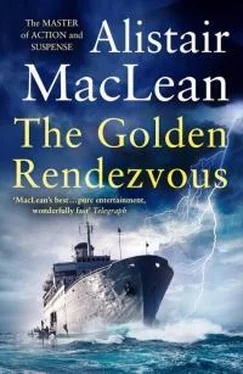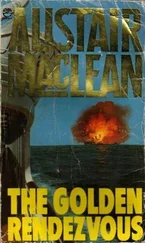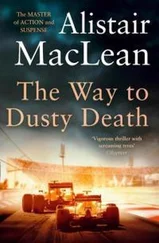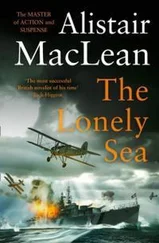And then I had it. I was lying on the floor of the hold and those huge crates were still sliding and crashing around with every heave and stagger of the Campari . And Susan. She was lying there too.
I pushed myself to my knees, fumbled around in my pocket till I found Marston’s pencil flash and switched it on. It still worked. The beam fell on Carreras and I’d time only to notice that the whole shirt-front was soaked with blood before I involuntary turned the torch away, sick and nauseated.
Susan was lying close in to the baffle, half on her side, half on her back. Her eyes were open, dull and glazed with shock and pain, but they were open.
“It’s finished.” I could scarcely recognise the voice as mine. “It’s all over now.” She nodded, and tried to smile.
“You can’t stay here,” I went on. “The other side of the baffle – quick.”
I rose to my feet, caught her under the arms and lifted her. She came easily, lightly, then cried out in agony and went limp on me. But I had her before she could fall, braced myself against the ladder, lifted her over the baffle and laid her down gently on the other side.
In the beam of my torch she lay there on her side, her arms outflung. The left arm, between wrist and elbow, was twisted at an impossible angle. Broken, no doubt of it. Broken. When she and Carreras had toppled over the baffle she must have been underneath: her left arm had taken the combined strain of their falling bodies and the strain had been too much. But there was nothing I could do about it. Not now. I turned my attention to Tony Carreras.
I couldn’t leave him there, I knew I couldn’t leave him there. When Miguel Carreras found out that his son was missing he’d have the Campari searched from end to end I had to get rid of him, but I couldn’t get rid of him in that hold. There was only one place where I could finally, completely and without any fear of re-discovery put the body of Tony Carreras. In the sea.
Tony Carreras must have weighed at least two hundred pounds, that narrow vertical steel ladder was at least thirty feet high, I was weak from loss of blood and sheer physical exhaustion and I’d only one sound leg, so I never even stopped to think about it. If I had, the impossibility of what I had to do would have defeated me even before I had begun.
I hauled him to the ladder, dragged him up to a sitting position against it, hooked my hands under his shoulders and jerked up his dead-weight, inch by inch, until his shoulders and hanging head were on a level with my own, stooped quickly, caught him in a fireman’s lift and started climbing.
For the first time that night, the pitching, corkscrewing Campari was my friend. When the ship plunged into a trough, rolling to starboard at the same time, the ladder would incline away from me as much as fifteen degrees and I’d take a couple of quick steps, hang on grimly as the Campari rolled back and the ladder swung out above me, wait for the return roll and repeat the process. Twice Carreras all but slipped from my shoulder, twice I had to take a quick step down to renew my purchase. I hardly used my left leg at all, my right leg and both arms took all the strain. Above all, my shoulders took the strain, I felt at times as if the muscles would tear, but it wasn’t any worse than the pain in my leg, so I kept on going. I kept on till I reached the top. Another half-dozen rungs and I would have had to let him drop for I don’t think I could ever have made it.
I heaved him over the hatch-coaming, followed, sank down on deck and waited till my pulse rate dropped down to the low hundreds. After the stench of oil and the close stuffiness of that hold, the driving gale-born rain felt and tasted wonderful I cupped the torch in my hand – not that there was more than a very remote chance of anyone being around at that hour, in that weather – and went through his pockets till I found a key tagged “Sick Bay.” Then I caught him by the collar and started for the side of the ship.
A minute later I was down in the bottom of the hold again. I found Tony Carreras’s gun, stuck it in my pocket and looked at Susan. She was still unconscious, which was the best way to be if I had to carry her up that ladder, and I had. With a broken arm she couldn’t have made it alone, and if I waited till she regained consciousness she would be in agony all the way. And she wouldn’t have remained conscious long.
After coping with Carreras’s dead weight, the task of getting Susan Beresford up on deck seemed almost easy. I laid her carefully on the rain-washed decks, replaced the battens and tied the tarpaulin back in place. I was just finishing when I sensed rather than heard her stir.
“Don’t move,” I said quickly. On the upper deck again I had to raise my voice to a shout to make myself heard against the bedlam of the storm. “Your forearm’s broken.”
“Yes.” Matter-of-fact, far too matter-of-fact. “Tony Carreras? Did you leave–”
“That’s all over. I told you that was all over.”
“Where is he?”
“Overboard.”
“Overboard?” The tremor was back in her voice now and I liked it much better than the abnormal calmness. “How did he–”
“I stabbed him God knows how many times,” I said wearily. “Do you think he got up all by himself, climbed the ladder and jumped – – Sorry, Susan. I shouldn’t – well, I’m not quite my normal, I guess. Come on. Time old Doc Marston saw that arm.”
I made her cradle the broken forearm in her right hand, helped her to her feet and caught her by her good arm to help steady her on that heaving deck. The blind leading the blind.
When we reached the for’ard break of the well-deck I made her sit in the comparative shelter there while I went into the bo’sun’s store. It took me only a few seconds to find out what I wanted: two coils of nylon rope which I stuck into a canvas bag, and a short length of thicker manilla. I closed the door, left the bag beside Susan, and staggered across the sliding, treacherous decks to the port side and tied the manilla to one of the guard-rail stanchions. I considered knotting the rope, then decided against it. MacDonald, whose idea this was, had been confident that no one, in this wild weather, would notice so small a thing as a knot round the base of a stanchion, and even if it were noticed Carreras’s men would not be seamen enough to investigate and pull it in: but anyone peering over the side and seeing the knots might have become very curious indeed. I made the knot round that stanchion very secure indeed for there was going to depend on it the life of someone who mattered very much to me – myself.
Ten minutes later we were back outside the sick-bay. I need not have worried about the sentry. Head bent low over his chest, he was still far away in another world and showed no signs of leaving it. I wondered how he would feel when he came to. Would he suspect he had been drugged – or would he put any unusual symptoms down to a combination of exhaustion and sea-sickness? I decided I was worrying about nothing, one sure guess I could make and that was that when the sentry awoke he would tell no one about his sleep. Miguel Carreras struck me as the kind of man who might have a very short way indeed with sentries who slept on duty.
I took out the key I’d found on Tony Carreras and unlocked the door. Marston was at his desk, the bo’sun and Bullen were both sitting up in bed. This was the first time I’d seen Bullen conscious since he’d been shot. He was pale and haggard and obviously in considerable pain, but he didn’t look as if he were on his last legs. It took a lot to kill off a man like Bullen.
He gave me a long look that was pretty close to a glare.
“Well, Mister. Where the hell have you been?” Normally, with those words, it would have come out like a rasp, but his lung wound had softened his rasp to a hoarse whisper. If I’d had the strength to grin, I’d have done just that, but I didn’t have the strength: there was hope for the old man yet.
Читать дальше
Конец ознакомительного отрывка
Купить книгу












